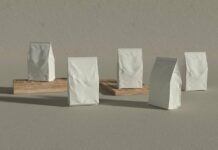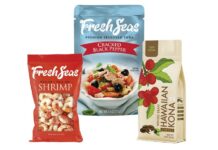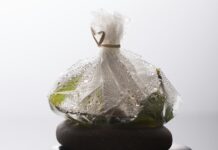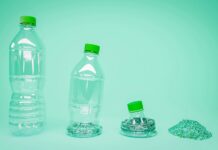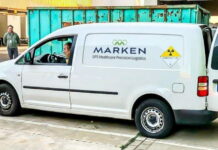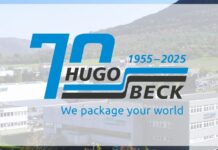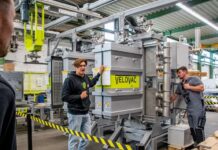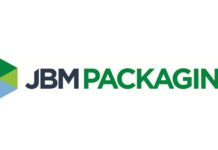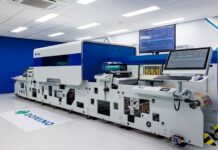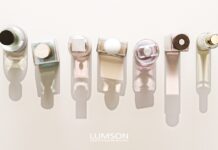Dow, Liby, a leading laundry brand in China, and LOVERE, an internet environmental tech company, has signed a strategic three-way Memorandum of Understanding (MoU) to address plastic packaging waste and promote a circular plastics economy in China. The MoU signing took place at Dow’s Customer Innovation Center in Shanghai, China.
The collaboration bolsters Dow’s sustainability target to stop the waste and close the loop, and marks the start of a long-term partnership to reduce plastic waste in the environment or landfill. The MoU focuses on three key actions: keeping plastics out of the environment, increasing collective impact through partnerships and delivering circular economy solutions. The collaboration drives these actions through three main areas of focus: designing for recyclability; collection of waste; and reusing or recycling plastic waste. The collaboration represented by the MoU has the potential to serve as an example of companies closing the loop and helping to drive the healthy and dynamic development of the plastics industry.
In addition, under the terms of the MoU, Dow’s INNATE™ tenter frame biaxially oriented polyethylene (TF-BOPE) based and all-polyethylene (PE) packaging solution will be applied to other product lines under Liby – expanding the use of fully recyclable packaging applications.
“We have seen increasing commercial adoption of designing for recyclability as more companies pledge to use recyclable packaging for their products in an effort to be more environmentally sustainable and responsible. Brand owners like Liby are leading the industry in taking action towards closing the plastics loop but beyond that, it takes all of us – industry peers, associations, governments, non-governmental organizations, retailers and end-consumers – working together to build a circular plastics economy,” said Bambang Candra, Asia Pacific commercial vice president for Packaging and Specialty Plastics, Dow.
“Not many end-consumers know which plastic packaging can be recycled and how to dispose them responsibly, resulting in material entering the wrong waste stream,” said Chen Jingye, CEO of LOVERE. “LOVERE’s independently-developed and Internet-connected Smart Sorting/Recycling Machines (SSRMs) is a technological innovation aimed to close the loop, from sorting to treatment to recycling. Consumers can sort and recycle their plastic waste at disposal simply through their WeChat account. We plan to make SSRMs accessible by placing them at various strategic points across the country, including residential districts, commercial supermarkets, office buildings and industrial parks, and they will be available at all times. At the end of 2020, LOVERE has recycled over 80,000 tons of urban waste, and we aim to do more with the signing of the MoU.”
“Through this collaboration, with our expertise, we are closing the loop in the waste management process and repurposing plastic waste into useful products. We are excited to partner Dow and Liby to take a step further in creating awareness of the benefits of recycling; and proper plastic waste disposal so that we can all play a part to reduce packaging waste in the very community we are in.”
The three companies have also committed to implementing content marketing as a tool in getting more end-consumers to understand the value of recyclable packaging and the concept of a circular economy, aimed at reducing plastic waste in China.
Zhang Liping, general manager of Liby Research and Development Center said, “Through this partnership with Dow and LOVERE, our goal is to build new consumer behaviours around the old adage: reduce, reuse and recycle for environmental sustainability. At the core of it, plastics need to be viewed not as waste – but as a valuable resource/ material that must be kept in the circular economy loop. To catalyze an effective circular plastics economy, as a brand owner, we have a shared responsibility to rethink plastic packaging; and ensure recyclability of our products’ packaging design. Being involved in the designing of, and utilizing recyclable solutions for plastic packaging, we can close the loop and make recycled plastic packaging a norm – while coming up with innovative solutions to empower consumers to reuse and recycle plastic waste together.”
This MoU follows Liby’s recent adoption of fully recyclable laundry packaging for its laundry pods, in a three-way collaboration between Dow, Liby and Fujian Kaida. Dow’s INNATE™ TF resins were utilized due to its all-PE structure that allows the end-product to be recycled in existing recycle streams, strong material properties offering high toughness in order to reduce leakage during e-commerce transportation, as well as excellent optics for stand-up shelf appeal and touch and feel.
Launched in July last year, Dow’s INNATE™ TF-BOPE resins provide converters, retailers and brand owners like Liby recyclable packaging solutions – empowering partners to design for recyclability from the start. Partners can choose materials with an innovative packaging solution that can achieve desired properties and satisfy needs throughout its lifecycle, while being completely recyclable.
The signing of the MoU advances Dow’s new sustainability target to enable 1 million metric tons of plastic to be collected, reused or recycled through its direct actions and partnerships by 2030 and to have 100 percent of its packaging applications to be reusable or recyclable by 2035.
About Dow Packaging and Specialty Plastics
Packaging and Specialty Plastics (P&SP), a business unit of Dow (NYSE: DOW), combines core strengths of R&D, worldwide reach, broad product lines and industry expertise to deliver high performing technologies for end use markets in food packaging, personal hygiene, infrastructure, consumer goods and transportation. P&SP is one of the world’s largest producers of polyethylene resins, functional polymers, and adhesives, and enabled by Pack Studios, is a leading innovator and collaborator across the value chain on sustainable application development and circular economy life-cycle design for plastics. www.dowpackaging.com
About Dow
Dow combines global breadth, asset integration and scale, focused innovation and leading business positions to achieve profitable growth. The Company’s ambition is to become the most innovative, customer centric, inclusive and sustainable materials science company. Dow’s portfolio of plastics, industrial intermediates, coatings and silicones businesses delivers a broad range of differentiated science-based products and solutions for its customers in high-growth market segments, such as packaging, infrastructure and consumer care. Dow operates 109 manufacturing sites in 31 countries and employs approximately 36,500 people. Dow delivered sales of approximately $43 billion in 2019.
About Liby
Liby is a leading brand of household detergents in China. Since its establishment in 1994, its products have been well received by consumers. As a leader in the field of home care, Liby specializes in technology in “China Light Industry Green Detergents” key laboratory and industry academician expert workstation in the industry. It currently owns 141 invention patents, surpassing the number of patents owned by the next four largest competitors in China. Liby is also one of the makers of China’s washing and care industry standards and has led or participated in the formulation. For more information, please visit their website here.
About LOVERE
LOVERE, through its independently-developed and Internet-connected Smart Sorting/Recycling Machine (SSRMs) aim to build a full chain from sorting to treatment to recycling – utilizing technologies like mobile internet, cloud computing, big data, internet of things as well as face recognition. Its SSRMs are able to sort eight categories of recyclables (paper, metal, textiles, cardboard, glass, plastics, beverage package as well as electronics), into more than 40 categories of waste, and subsequently send them to recycling companies. LOVERE will continue to promote the idea of ‘recycling is the new fashion’ and explore new possibilities of high-value use of recycled products and create more brands of recycled products – to build a recycling economy for the sustainable development of our planet.




